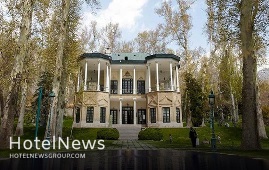
The Sa’dabad Cultural-Historical Complex on Tuesday reopened its doors to the public as some restrictions over the coronavirus pandemic have been relaxed in Tehran.According to the National Headquarters for Coronavirus Control, Tehran province is in the low-risk “yellow” zone and museums and historical sites across the province could reopen and resume their activities. Iran closed cultural heritage museums and historical sites across the country in a preventive measure amid fears of coronavirus outbreak last February, but as the coronavirus lockdown was eased, they were reopened in early May.Due to a sharp rise in the number of coronavirus infections and deaths, museums and all art and cultural centers, universities, schools, seminaries, English schools, libraries, movie theaters, mosques, beauty salons, and several other entities went on lockdown during July.The closure continued during November over the third wave of the COVID-19 pandemic. In June, Mohammadreza Kargar, the tourism ministry’s director for museums and historical properties announced that Iranian museums and historical sites have taken 600 billion rials (about $14.2 million) hit from the coronavirus outbreak.If the country was in normal condition, the museums would host over 25 million visitors, but now they have faced a huge loss as there is almost no visitor to the museums, he noted.In October, Cultural Heritage, Tourism, and Handicrafts Minister Ali-Asghar Mounesan warned that Iran’s cultural heritage and tourism would be in a critical situation if the crises caused by the outbreak of the coronavirus would be continuing.With the outbreak of the coronavirus, museums were at the forefront of closures and for several months now, they have not had any revenue from the sale of tickets, Mounesan explained.Meanwhile, the ministry is facing a shortage of funds in the field of cultural heritage, which causes problems for maintaining and preserving 34,000 National Heritage properties as well as 24 UNESCO-tagged sites, the official explained.It was estimated that museums would earn about 300 billion rials (about $7.1 million) in the first quarter of the year, but over the coronavirus pandemic they did not even come close to this figure, he added.In July, Mounesan said that revenues from museums were almost eight billion rials (about $190,000) during the first three months of the current Iranian calendar year (started March 20, 2020), a sharp decline compared to around 300 billion rials (over $7 million) in the same period last year. Earlier this week, the minister said that Iran’s tourism has suffered a loss of over 140 trillion rials (about $3.33 billion) since the outbreak of the coronavirus pandemic. Sprawled on about 110 hectares of a mountainside parkland in northern Tehran, the Sadabad Cultural-Historical Complex is used to be a royal summer residence during the Qajar and Pahlavi eras.The complex was initially established and inhabited by some Qajar monarchs in the 19th century. It has undergone further expansions from the 1920s until the 1979 Islamic Revolution. The site embraces a variety of buildings, some of which turned to be house museums showcasing a wide range of royal families’ memorabilia including lavishly-made furniture, dishware, automobiles, carpets, and miniature paintings.
Create: Jan 27, 2021 Edit: Jan 27, 2021 Regional News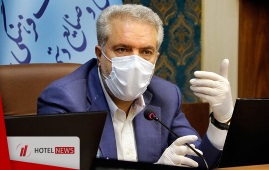
“Corona is a fact, but can the virus stop tourism? Certainly not. For us, the coronavirus is a new experience in dealing with crises that teaches tourism experts around the world how to deal with such a disaster, and thankfully governments are turning this into an opportunity for better planning,” Ali-Asghar Mounesan said, ISNA reported. He made the remarks in a video showcased on Tuesday evening during a prize-giving ceremony in which a select of tourism businesses, tour operators, investors, and hoteliers were honored. “Tourism experts will certainly find a way to deal with this great crisis. As if the measures so far been taken in Iran and all over the world show that we will surely succeed [to make a big rebound] through proper smart planning.” Addressing the attendees to the ceremony, the minister explained; “Investments and the launch of new projects in the tourism sector have been increased dramatically underway across the country. Of these, about 600 are hotel-related projects that show a very promising future, conveying a message that investors see profitable prospects for Iran’s tourism.” Elsewhere in remarks, the official said “We are not saying that tourism should [merely] replace oil [revenues], but tourism can become first [sector of] economy in the country replacing revenues [currently being come from [the export of] mineral and raw resources.” “Tourism can create an easy way to earn and create employment by tapping into the existing historical and natural capacities of the country.” Mounesan has long been attaching importance to tourism as a source of revenue, which could substitute petro-dollars. Back in 2017, he said: “Every single foreign tourist visiting Iran spends an average of $1,200, bringing in income as much as exporting 30 barrels of oil.” Referring to the pandemic and its impacts on the traveling sector, he said: “All the economists in the world have predicted [dramatic] changes and developments for many once-prosperous sectors….. However, the technology is advancing, and smart solutions… will certainly bring changes in the world's economic sectors.” In June, the United Nations World Tourism Organization praised efforts made by Iran’s tourism ministry to manage the travel industry during the coronavirus pandemic. UNWTO Secretary-General Zurab Pololikashvili said in a letter to Mounesan that the country's measures have truly earned plaudits to mitigate the impact on tourism. “A series of measures that the Ministry of Cultural Heritage, Tourism and Handicrafts of Iran has taken, in accordance with the guidelines and recommendations of UNWTO, has truly earned plaudits as an effective practice to mitigate the impact on tourism,” the letter reads. Some experts believe that the coronavirus pandemic may turn tours and travels into luxury items as observing health protocols will raise the cost of travel in the country. Mohammad Ali Vaqefi, the vice president of the Iranian Tour Operators Association, warned earlier in June that with the continuation of the coronavirus outbreak, tourists may prefer individual travel rather than tours, adding that they may also choose to go on a trip by their vehicles and stay in tents or in the nature instead of hotels. In the global scene, part of the new travel puzzle is the jet-set mindset focusing on tough hygiene care and social distancing as cardinal guidelines for slowing the spread of the virus. So the average expenditure will be raised for a typical traveler particularly inbound passengers so lesser ones can afford to buy privacy and space and safer travel amenities. Meanwhile, deputy tourism minister Vali Teymouri, has said the tourism industry of Iran will get back on the right track sooner than expected thanks to measures taken to tackle the spread of coronavirus. “I believe that tourism industry of the country will get back on the right track far sooner than generally expected thanks to the measures taken to deal with the spread of coronavirus in tourist destinations, hotels, stopovers, and all the centers which are affiliated with the Ministry of Cultural Heritage, Tourism and Handicrafts,” Teymouri said. Iran expects to reap a bonanza from its numerous tourist spots such as bazaars, museums, mosques, bridges, bathhouses, madrasas, mausoleums, churches, towers, and mansions, of which 24 being inscribed on the UNESCO World Heritage list. Under the 2025 Tourism Vision Plan, it aims to increase the number of tourist arrivals from 4.8 million in 2014 to 20 million in 2025. The latest available data show eight million tourists visited the Islamic Republic during the first ten months of the past Iranian calendar year (started March 21, 2019).
Create: Aug 5, 2020 Edit: Aug 6, 2020 Regional News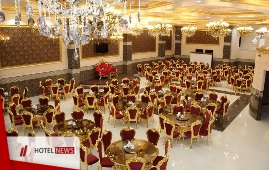
The head of the Tehran Chamber of Trade Unions announced; All businesses, which were considered high-risk, can start their activities on June 26. These include restaurants, reception halls, cafes, trias, fast food restaurants, saunas and massages.
Create: May 26, 2020 Edit: May 26, 2020 Regional News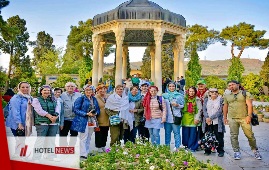
TEHRAN – Japan and Austria have significantly downgraded their travel warnings on Iran, a caution they, amongst some other countries, issued following the deadly crash of a Ukrainian plane near Tehran last month. The jetliner, with 176 people onboard, was mistakenly downed on January 8 by the Islamic Revolution Guards Corps (IRGC) air defense system, a few hours after Iran fired dozens of missiles at a U.S. airbase inside Iraq in retaliation to the assassination of Iranian Lieutenant General Qassem Soleimani in Baghdad on January 3. “The Ministry of Foreign Affairs of Japan has eliminated its travel warning on Iran [asking its citizens to avoid ‘non-essential’ travel to the country] and it has also terminated depicting Iran’s security map with a warning sign,” ISNA reported on Tuesday. An advisory, which warned about traveling to Iran, is now deleted from the website of the ministry, the report added. Austrian ambassador to Tehran Stefan Scholz on Monday wrote on his Instagram account that his country has lowered its travel warning for Iran. “Austria has downgraded its travel warning for Iran, repealing its general advice against non-essential travels following a thorough reassessment of the security situation.” “We believe that the risk to Austrian nationals except for some specific border areas has changed. This decision will also further contribute to civil society contacts and commerce,” the envoy added. Late in January, the EU Aviation Safety Agency (EASA) approved that European airlines can return to parts of Iranian and Iraqi airspace. Germany’s Lufthansa was among airlines that canceled flights over the affected airspace. Inbound tours started to severely drop following the crash, triggering a major setback to Iran’s budding tourism industry. The blow, however, is being hoped to be amended as soon as possible by a comprehensive action plan Iran’s tourism ministry has put into practice since January 25. In the same time, Iran’s Minister of Cultural Heritage, Tourism and Handicrafts Ali-Asghar Mounesan issued a statement, inviting all travelers and holidaymakers to visit the ancient land, saying that the country-size guesthouse is wholeheartedly ready to receive tourists from around the world. The official emphasized that the Iranian government is trying its best to host incoming tourists by improving tourism infrastructure, offering attractive and pocket-friendly packages, as well as incentives such as visa waivers or 90-day visas on arrival. The 2019 Travel Risk Map, which shows the risk level around the world, put Iran among countries with “insignificant risk”, a category where the UK, Denmark, Switzerland, Norway, and Finland are placed in.
Create: Feb 19, 2020 Edit: Feb 19, 2020 Regional News
Airbnb is unveiling Animal Experiences – a brand new category of Airbnb Experiences that allow people to better understand animals through caring, expert hosts and set a new standard for animal tourism. With 1,000 Experiences co-hosted by over 300 species and their human advocates, guests can now paddleboard with corgis, kayak with conservationists, learn alongside urban beekeepers or skateboard with a world record-winning bulldog! Airbnb Animal Experiences offers a fresh new way to connect with animals near and far, so that even busy urbanites can reconnect with the natural world through hiking with rescue dogs, chilling out with alpacas or cuddling cows. Guests will meet animals in places that allow for gentle observation and bring a sense of connection far beyond animal selfies or performances. For those seeking more adventure, guests can discover arctic foxes or even help rescue puppies lost within the Chernobyl Exclusion Zone. At Airbnb, we envision a world where everyone can belong anywhere. Today, we extend our passion for belonging beyond humankind, committing to protect the welfare of animals across any Experience that features them. Joining more than 40,000 Airbnb Experiences available across 1,000 cities worldwide, Airbnb Animal Experiences are underpinned by a new, industry-leading animal welfare policy, created in collaboration with World Animal Protection. Animals should be appreciated for their intrinsic value and this new animal welfare policy has been designed to ensure their wellbeing at all times. Ranging from afternoon tea with naughty sheep to multi-day safaris, Airbnb Animal Experiences are hosted by caring experts as an antidote to typical tourist attractions that are notorious for ethical concerns. You will never find an Airbnb Experience where you can kiss a dolphin or ride an elephant. Beyond helping people get to better understand animals and meet them in a new way, over 100 Airbnb Animal Experiences are Social Impact Experiences, cementing our commitment to animals in the long-term by directing all proceeds from bookings to nonprofits. Supporting causes such as conservation, animal rescue, and veterinary care, these Experiences help scale impact, foster empathy and include caring for rescued horses, seeing released macaws and spending a day with donkeys. Other notable Airbnb Animal Experiences will come to life both on and offline through an exclusive partnership with The Dodo, the leading brand for mobile animal content in the U.S. and one of the world’s most-engaged media brands on social. Airbnb Animal Policy Highlights We are the first major booking platform to offer a dedicated category of animal experiences underpinned by a progressive new animal welfare policy, created in conjunction with World Animal Protection. New highlights include: Wild animals: there should be no direct contact including, but not limited to, petting, feeding, or riding animals Working animals: maximum one rider and never more than 20% of the animal’s weight, never to be overworked Marine mammals: should never be in captivity for entertainment Broader host business: should not feature elephant rides, big cat interactions, illegal wildlife trade, sporting events such as canned and trophy hunting, animals performing for entertainment Responsible travel: no wild animals as selfie props or any negative training techniques World Animal Protection will continue working with Airbnb on its approach to animal welfare based on the latest evidence and research. ANIMAL EXPERIENCES HIGHLIGHTS: Tea with Naughty Sheep (Loch Lomond, United Kingdom) Meet the Dogs of Chernobyl (Slavutych, Ukraine) Discover Arctic Foxes (Sudavik, Iceland) New Zealand Getaway and Horseplay (Auckland, New Zealand) Gibbon Research Assistant Experience (Phuket, Thailand) Urban Rooftop Beekeeping (Hamilton, Canada) Butterflies and Caterpillars Oh My! (Columbus, Ohio) Meet Life-Saving Animals (Siem Reap, Cambodia) See Released Macaws (Nosara, Costa Rica) Ultimate Cape Town Birding (Cape Town, South Africa) Wild Brooklyn Parrot Safari (Brooklyn, New York) Go on a Safari with a Maasai Guide (Nakuru, Kenya) Hike Runyon Canyon with a Rescue Dog (Los Angeles, CA) A Day in a Gaucho’s Life in the Andes (Mendoza, Argentina)
Create: Oct 12, 2019 Edit: Nov 3, 2019 International News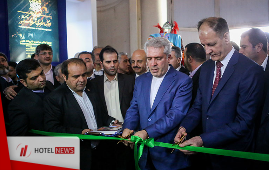
The twelfth international exhibition of tourism and affiliated industries of Tehran began this morning (Tuesday, February 12rd) with the presence of vice president and head of the Cultural Heritage, Handicrafts and Tourism, his deputies, executives, provincial executives and a group of activists and tourists of the country's tourism industry. In the opening ceremony of the 12th International Exhibition of Tourism and Related Industries of Tehran, which was held at the Persian Gulf Hall in International Exhibition, a number of ambassadors, delegates and delegations from foreign countries, including the Minister of Tourism and Antiquities of Iraq, also attended. . While pointing to the presence of 660 domestic companies and 57 foreign companies during the exhibition, Deputy of Tourism Minister, Vali Teimori said: The 12th International Exhibition of Tourism and Affiliated Industries of Tehran with Domestic Tourism Trends and focus on provincial offices , will be held. In a short statement, Vice President and Head of the Cultural Heritage, Handicrafts and Tourism Organization, Ali Asghar Monsein said: "In today's world, the tourism industry has grown exponentially compared to other industries that are developing." The head of the country's tourism service said: "I am very hopeful for the future of the tourism industry in the country, and I received good signs about it, because in the first nine months of this year, the number of tourists entering the country crossed the border with 6 million people.
Create: Feb 12, 2019 Edit: Feb 13, 2019 Regional News
Hotel News -- Restoring Green Bay's Hotel Northland is going to take a bit more time than expected, the hotel announced Friday. The project to restore the 90-year-old building as a hotel began in 2016. Searching for specific parts has drawn out the process, construction officials say. “Many of the hotel’s original architectural elements simply can’t be duplicated today causing us to scour the country and beyond for a variety of replacement parts and pieces,” explained Executive Vice President Kelly Schleif of Ganther Construction. Those challenges have prompted the hotel to take guests sometime next year, rather than by the end of 2018 as some had hoped. “We are going to take whatever time is necessary to finish it properly to make sure everything is exactly as everyone in the community expects it to be. And then we are going to open the doors," said General Manager John D. Williams. Williams is leading the project. Until then, the Poke the Bear restuarant at the hotel is set to open December 20 at 11 a.m. It will be open Tuesday through Saturday, serving lunch, dinner, and cocktails from 11 a.m. until 7 p.m. The new bar and restaurant will expand its hours and days of service with the coming new year. Poke the Bear guests should enter at the hotel’s entrance at 304 N. Adams Street.
Create: Dec 16, 2018 Edit: Dec 17, 2018 International News
The family real estate company once run by Jared Kushner is buying a hotel on the Lower East Side of Manhattan, the third hotel it has purchased this year. The Kushner Cos. said Tuesday that it is in contract to buy the 20-story Hotel on Rivington for an undisclosed amount. The company known for residential and office buildings bought two hotels in Long Branch, New Jersey, earlier this year. The company bought more than two-dozen apartment buildings in lower Manhattan when Jared Kushner was CEO. He stepped down from that position last year to become an adviser to his father-in-law, President Donald Trump. The Hotel on Rivington has a cocktail lounge and a three-story penthouse. A room with a king-size bed goes for more than $300 a night.
Create: Nov 27, 2018 Edit: Nov 27, 2018 International News
World Travel Market London will be held at ExCeL London between 5 - 7 November 2018. ExCeL London is an exhibitions and international convention centre located on the northern quay of the Royal Victoria Dock in London Docklands, between Canary Wharf and London City Airport. ExCeL London 1 Western Gateway, Royal Victoria Dock London Docklands, E16 1XL Telephone: +44 (0)20 7069 4000 Website: www.excel-london.co.uk Monday 5 November 10:00 - 19:00 Admission to registered Exhibitors, Exhibitor Invitees, Ministers, Speakers and International Media only. Tuesday 6 November 10:00 - 18:00 Admission to all badged attendees and students registered for Tuesday.
Create: Nov 5, 2018 Edit: Jun 16, 2019 Events and Exhibitions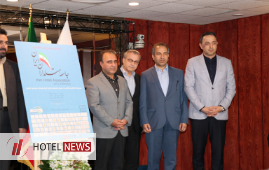
Hotel News - a news conference and the ceremony of the poster unveiling of the first national conference of Iranian Hoteliers Association was held on Tuesday, September 20, 2018, at the Melal Hall of Howeyzeh Hotel in Tehran. a group of hotel industry managers and more than 80 journalists and media representatives attended the event in addition to the chairman and members of the board of directors of the Iranian Hoteliers Association in Iran.
Create: Oct 21, 2018 Edit: Nov 12, 2018 Previous Events
Master developer Nakheel today awarded a contract worth more than EUR5.6 million (AED23.7 million) for piling work at its iconic, 260H metre PALM360 luxury hotel and residential project on Dubai’s world-famous Palm Jumeirah. The company has named the Dubai branch of BAUER Spezialtiefbau GmbH, headquartered in Germany, for the work, which will take four months to complete. The milestone was marked today (Tuesday) at Expo Real in Munich, where Nakheel is currently showcasing EUR14 billion (AED58 billion) worth of projects, including PALM360. The process will involve driving almost 600 piles as far as 54 metres below ground in preparation for the construction of PALM360 which will be the tallest structure on Palm Jumeirah. The construction tender is expected to be released in Q1 2019, with project completion in 2021. PALM360 comprises the Raffles The Palm Dubai Hotel and Raffles Residences PALM360. The project will also boast the world’s largest sky pool, connecting the two towers 170 metres above ground, as well as a host of dining, leisure and wellbeing facilities. Located on Palm Jumeirah’s western crescent in 500,000 square feet of landscaped grounds, PALM360 will offer the ultimate in luxury living and leisure. Complementing 125 opulent Raffles hotel rooms are 331 Raffles-branded residences, including 16 ultra-plush penthouses spanning up to 12,000 sq ft – equivalent to four tennis courts. Each penthouse has its own infinity pool, gym, home theatre and as the name suggests, 360 degree views of Dubai.
Create: Oct 13, 2018 Edit: Nov 1, 2018 International News
